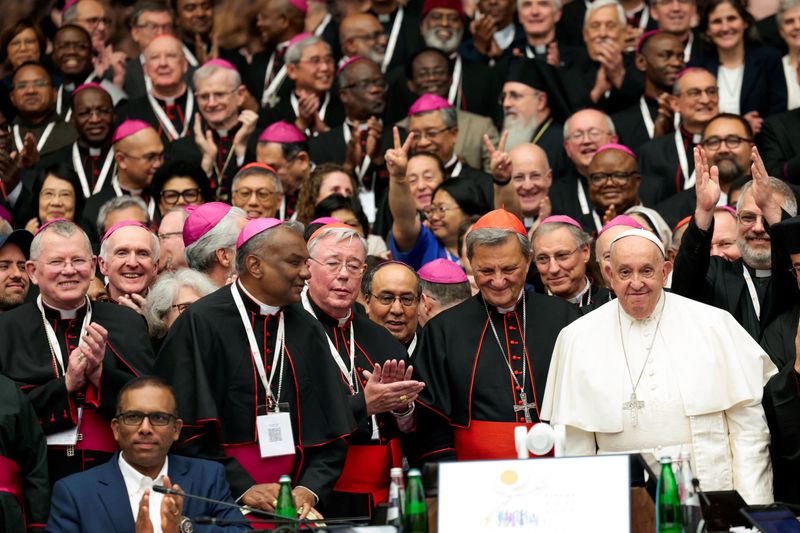By Joshua McElwee
VATICAN CITY (Reuters) – A major Vatican summit of global Catholic leaders ended on Saturday with a call for women to be granted more leadership roles in the Church but stopped short of calling for women to be ordained as clergy.
The gathering, which included cardinals, bishops and lay people from more than 110 countries, also did not take a stand on inclusion of the LGBTQ community, despite discussion that it might call on the Church to be more welcoming.
Pope Francis called the month-long summit, known as a Synod of Bishops, to consider the future of the worldwide Church. It was the second of two gatherings, held a year apart, and featured closed-door discussions among 368 “members” with voting rights, including nearly 60 women.
Advocates for greater roles for women in the Church had hoped the synod might call for women to serve as deacons. In its final text, the synod did not move forward on that possibility, but said “there is no reason or impediment that should prevent women from carrying out leadership roles in the Church”.
The question of women deacons, the document said, “remains open” and “discernment needs to continue”.
The Catholic Church has an all-male clergy and Pope John Paul II declared it had no authority to ordain women as priests. But church historians say there is evidence that in earlier centuries women served as deacons – ordained ministers who, unlike priests, cannot celebrate the Mass.
Francis, 87, has previously created two Vatican commissions to consider ordaining women as deacons. The issue is one of 10 subjects in the synod’s discussions that he has assigned for further study to groups that are to report to him by next June.
The synod’s final document, a 52-page text approved by the assembly late Saturday afternoon, also called for lay Catholics to be given a greater voice in the selection of bishops, and apologised several times for the “untold and ongoing” pain suffered by Catholics who were abused by clergy.
The text’s 155 paragraphs each required a two-thirds vote for approval. The paragraph on women deacons received the most no votes, 258-97, but still passed.
NO MENTION OF LGBTQ CATHOLICS
The text did not mention the LGBTQ community, though it made a veiled reference to people in the Church who “experience the pain of feeling excluded or judged because of their marital situation, identity or sexuality”.
Treatment of LGBTQ Catholics had been a hot point of debate in the 2023 synod, with reports that some members offered emotional personal testimonies in the assembly about family members who feel excluded from the Church.
Rev James Martin, a prominent American Jesuit priest who ministers to the LGBTQ community and was a synod member, said it was “not a surprise” the new text did not specifically mention the group.
“We talk about the pain of those who feel excluded,” he said of the final text. “The dialogue around LGBTQ issues was much easier this year”.

Francis had been expected to issue his own document responding to the synod text, but he told the assembly he was no longer planning to do so. The pope said he instead wanted to offer the synod’s text as a “gift” to the world’s 1.4 billion Catholics.
The pope is due to formally close the synod gathering with a Mass on Sunday in St. Peter’s Basilica.